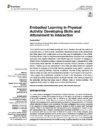Abstract
This article focuses on embodied learning and how it develops through the practice of a physical activity. It aims to clarify fundamental theoretical aspects of the development that takes place when practitioners enhance their way of participating in the activity. Pursuing this aim, I draw on the phenomenological description of embodiment processes and argue, that despite differences in the inherent logic and motivation for engaging in different kinds of physical activities, a phenomenologically based understanding of skills constructively helps describe the development acquired through practicing a physical activity. I thereby argue that descriptions of how skills are incorporated and exercised are relevant to analyses of embodied learning processes taking place in sporting as well as non-sporting activities, including recreational mountain-biking, expressive and creative dance activities, and improvisational practices. In continuation of this argument, I also suggest that practitioners’ capability to attune to the interactions of the activity contribute yet another theoretical aspect we should consider, when aiming at describing the embodied learning that takes place in different kinds of physical activities. This suggestion finds support in recent work on action and interaction.



Responses